
by World Moms Blog | Nov 9, 2015 | 2015, Asia, Clean Birth Kits, Maternal Health, Mission Motherhood
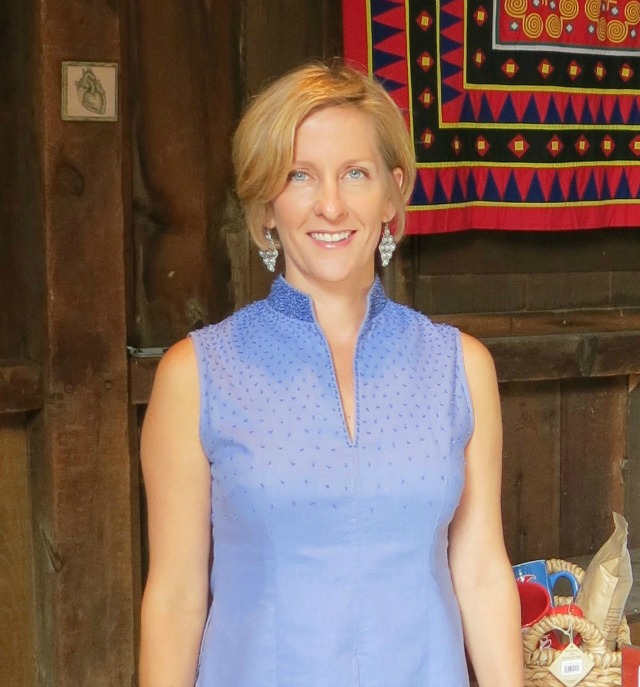
Kristyn Zalota is a contributor for World Moms Blog from the USA. She is also the founder of Cleanbirth.org
As part of World Moms Blog’s collaboration with BabyCenter’s Mission Motherhood™, our World Moms are writing posts on maternal health around the world. In today’s post, Kristyn Zalota of Cleanbirth.org in the USA writes about the very first time she witnessed the results of her tireless work to help mothers and babies in rural, hard to reach areas of Laos.
“From 2009-10, I lived and worked on the Thai-Burma border and Cambodia. While there, I learned that mothers and babies die regularly of preventable things like infection. Laos, a country I had visited many times, has the highest infant and maternal mortality in the region…When I returned home to the United States in 2010, I began to brainstorm how I could help mothers in these rural areas.”
Read the full post over at BabyCenter’s Mission Motherhood™!
World Moms Blog is an award winning website which writes from over 30 countries on the topics of motherhood, culture, human rights and social good. Over 70 international contributors share their stories from around the globe, bonded by the common thread of motherhood and wanting a better world for their children.
World Moms Blog was listed by Forbes Woman as one of the "Best 100 Websites for Women 2012 & 2013" and also called a "must read" by the NY Times Motherlode in 2013. Our Senior Editor in India, Purnima Ramakrishnan, was awarded the BlogHer International Activist Award in 2013.
More Posts

by Michelle Pannell | Nov 9, 2015 | 2015, Awareness, Being Considerate, Body Image, Childhood, Education, Europe, Helping, Inspirational, Language, Life Lesson, Memories, Motherhood, Older Children, Parenting, Relationships, Respect, School, Siblings, UK, World Motherhood
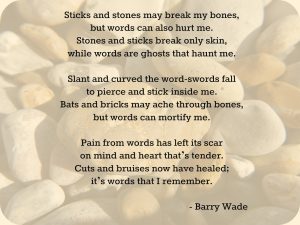 I was happily preparing dinner the other day and I could hear my three children chattering away in the hall. Pretty soon the talking turned to bleeting, yes bleeting… and baaing, like a sheep. I could hear my 12-year-old son, JJ, say, “everyone is doing it at school.”
I was happily preparing dinner the other day and I could hear my three children chattering away in the hall. Pretty soon the talking turned to bleeting, yes bleeting… and baaing, like a sheep. I could hear my 12-year-old son, JJ, say, “everyone is doing it at school.”
With my parenting radar on alert I popped my head out of the kitchen to ask what they were talking about and JJ explained to me that there is a teacher at school who looks like a sheep and all the students baa at her.
I was pretty horrified at this and I asked what ‘Miss’ (as they call their female teachers) said about their behaviour. JJ told me it was all done behind her back but she was a ‘good laugh’ and he couldn’t imagine she would mind. This of course was one of those moments that led to me abandoning dinner and sitting all three children down for a chat.
If I can help it, I don’t want any child of mine becoming a bully.
You might think I over reacted and that all children get involved in silly things, harmless teasing some might say. Character forming I’ve heard it called before and we’ve all heard the old rhyme ‘sticks and stones may break my bones but names will never hurt me’ but it is not true, names really can harm a person, especially a vulnerable one.
I know this first hand, I was called many names as a young child, most of them revolving around my weight and being just a little (and it really only was a little back then) bigger than the average girl but the main reason I know about the hurt and pain that continues for many years long after the name calling stops is because I was a name caller and I really hurt someone else.
I still feel the shame when I write that, I don’t think the regret for the damage I did to a little boy called Simon (name changed for obvious reasons) will ever leave me. I first wrote about having been a bully as a child back in 2010 and it was so important to face up to the past and really acknowledge what I did. I had no idea at the time that what I was doing could be so destructive, as far as I was concerned I was just a little girl desperate to fit in with the gang and going along with everyone else.
But when your whole class cross their arms and mutter ‘fleas, injected for all my life’ each time you come near them, it is a big deal. I don’t recall Simon ever letting on at school just how much this hurt him but I do think he spent a lot of time on his own. The sad thing is that I don’t really remember that much about the whole situation to be honest, as it was inconsequential to me but of course not to him, not when it was damaging his self-esteem each and every day.
That damage went on for a very long time too. I know this as when I was 28 (quite some years ago now) I was contacted by Simon through Friends Reunited and then Facebook. He asked me about our time at school (primary school, ages 7-10) and why certain things had happened and did I remember…. I had to honestly say ‘No. No, I do not remember most of it’. I think it was therapeutic for Simon to be in touch with a few of his bullies and to be able to finally get a heartfelt sorry from us.
I praise the Lord that he told me he had found a good partner and was at last finding some peace and happiness after years of counselling. He talked about his early upbringing with a stern father in the military and a mother who was never mentally present. Moving areas and schools every two or three years of his life had been tough and a bunch of middle-class kids made it worse and made him doubt himself.
As I quite seriously told my own children this story a couple of weeks ago I had a lump in my throat and I had to fight to stop the tears forming. They were pretty shocked and I really hope they understood what I was saying about how something that seems harmless and just a case of simple teasing can turn out to be life-damaging for some children or even adults.
From the 16th – 20th November, it is anti-bullying week here in the UK but I’d encourage you, wherever you live, to please have a chat with your children about bullying and help them to understand that the line between harmless fun and detrimental behaviour is very fine. Best to just never get close to it and to adopt a positive attitude towards all people, whether they are easy to be around or not.
Have you ever been involved with bullying, either on the receiving or doling out side? What impact has it had on you?

Michelle’s tales of everyday life and imperfect parenting of a 13-year-old boy and 9-year-old twin girls and her positive Christian outlook on life have made her name known in the UK parenting blogosphere. Her blog, Mummy from the Heart, has struck a chord with and is read by thousands of women across the world.
Michelle loves life and enjoys keeping it simple. Time with her family, friends and God are what make her happiest, along with a spot of blogging and tweeting, too! Michelle readily left behind the corporate arena but draws on her 25 years of career experience from the fields of hotel, recruitment and HR management in her current voluntary roles at a school, Christian conference centre, night shelter and food bank.
As a ONE ambassador, in 2012 Michelle was selected to travel on a delegation to Ethiopia with the organisation to report on global poverty and health. Then in 2014 she was invited to Washington, DC, where she attended the AYA Summit for girls and women worldwide. When asked about her ambassadorship with the ONE Campaign, she stated, "I feel humbled to be able to act as an advocate and campaigner for those living in poverty."
More Posts - Website
Follow Me:






by To-Wen Tseng | Nov 6, 2015 | 2015, Awareness, Communication, Journalism, Kids, Life Lesson, Media, Responsibility, To-Wen Tseng, Work, Working Mother, World Motherhood, Writing
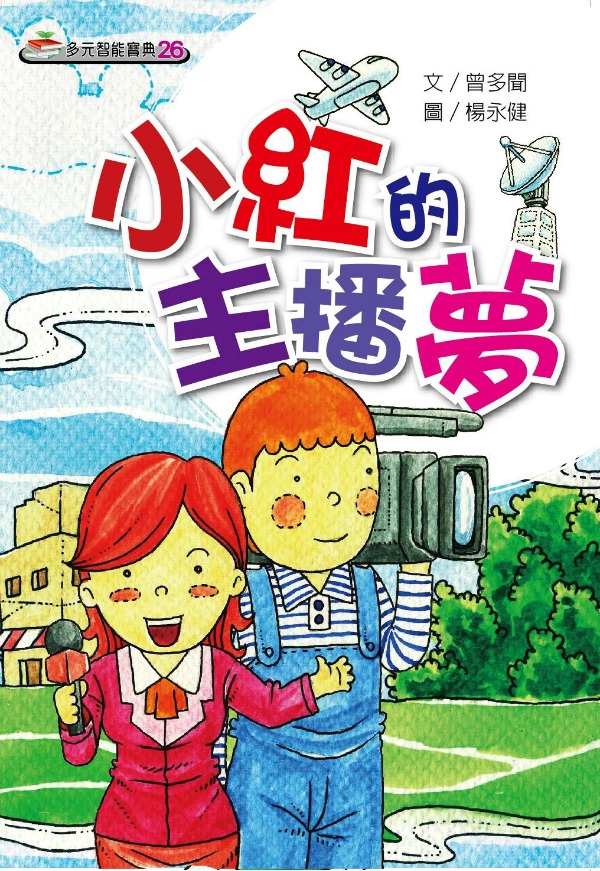
My 4th book (and 2nd children’s book) was out in the public in paperback this August. Now I finally have some time to sit down and write a few words about this brain child of mine. (more…)

by Tara Wambugu | Nov 5, 2015 | 2015, Culture, Kenya, Tara Wambugu
There’s a lovely naming culture practiced by the Kikuyu tribe here in Kenya: the the first-born son is named after the paternal grandfather, the first-born daughter is named after her paternal grandmother, and so on. My husband is Kikuyu, and we decided to adopt this tradition for our girls’ middle names.
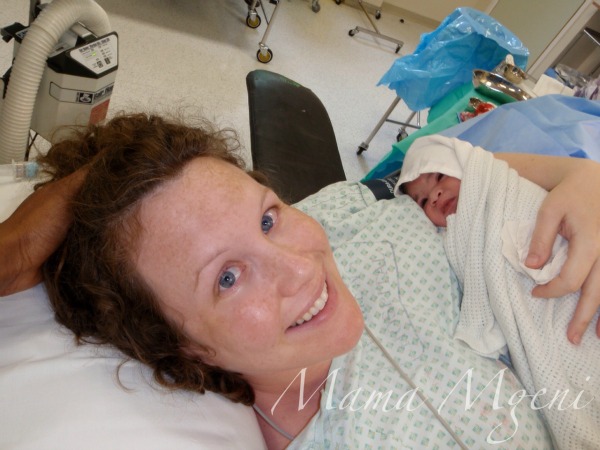
Claire, our eldest child, was given Nyambura as her middle name, after my husband’s mother. Nyambura means “born during the rains.” Since Claire was born in the U.K., we think her name is beautifully befitting! The second-born daughter would traditionally be named after her maternal grandmother, but we really wanted both girls to have Kenyan middle names. When Heidi was born, we decided to give her the middle name Makena, which means “the happy one.” Her name also fits her perfectly.
There are over 40 tribes in Kenya, with very different cultures and traditions. After choosing to name our girls with traditional Kenyan middle names, I was curious about the naming traditions of other tribes. I reached out to the mothers in a local online parenting group here in Nairobi to ask about their own tribes’ naming traditions.
Several tribes follow the tradition of naming their children according to the time of day the child was born. A boy named Otieno was likely born at night. The name Chebet is for a girl who was born at midday when the sun is at its highest point. A boy with the name Kerotich may have been born in the early evening, when the cattle come back to the corral.
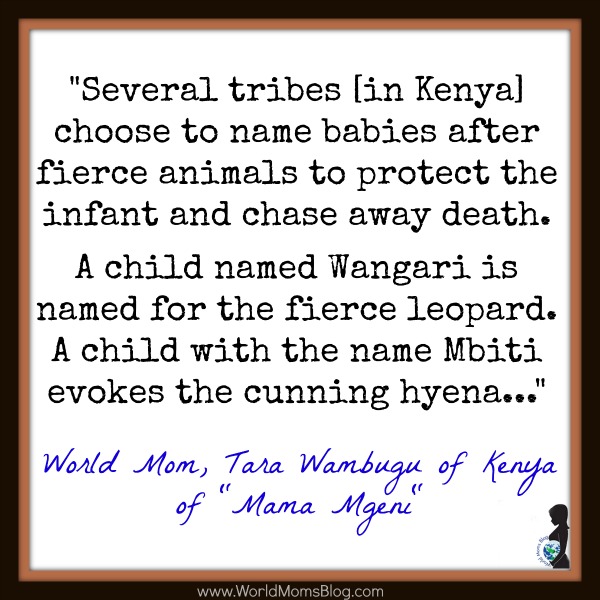
Many tribes practice naming their children after events or circumstances surrounding the child’s birth. In this tradition, the name Okello is for the first baby boy born after twins. Cheruto is a girl’s name for a child born away from the family’s traditional homeland. The name Aoko signifies a child born outside. The name Nyanchera is for a child who was born on the way to hospital.
Several tribes also share the custom of naming babies after the seasons. The name Akeyo signifies a child born during the harvest. The name Kipkemei is for a child born during the dry season. Nanzala is a girls’ name for a child born when there is famine.
Several tribes choose to name babies after fierce animals to protect the infant and chase away death. A child named Wangari is named for the fierce leopard. A child with the name Mbiti evokes the cunning hyena. A boy called Njogu is named for the mighty elephant.
I loved learning about all these beautiful traditions for naming your baby!
I think it’s so wonderful that a name can tell a story, and can carry with it the memory of generations of ancestors. Some even believe that a baby’s name will have a strong influence on the child’s eventual personality.
I am so happy that both of our girls have beautiful, meaningful Kenyan names!
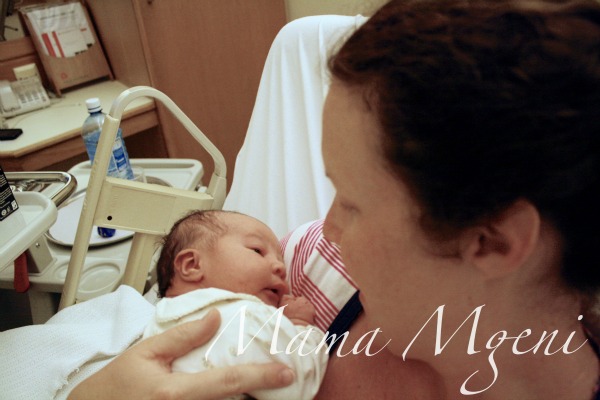
What are the cultural practices for naming babies where you come from? Did you follow a cultural tradition when naming your own children?
This is an original post to World Moms Blog by Tara Wambugu. Follow Tara and her family’s adventures on her blog, Mama Mgeni, and connect with her on Facebook and Twitter.
Photo credits to the author.
Tara Wambugu is a wife, a mother of two, and a Kenya-based lifestyle blogger covering parenting, family life, travel, and more. A former aid worker, Tara has worked in various countries in Europe, Central Asia, Africa, and Central America. She is now a stay-at-home mom living in Nairobi with her husband and their two sassy little girls. You can follow Tara and her family’s adventures on her blog, Mama Mgeni.
More Posts - Website
Follow Me:





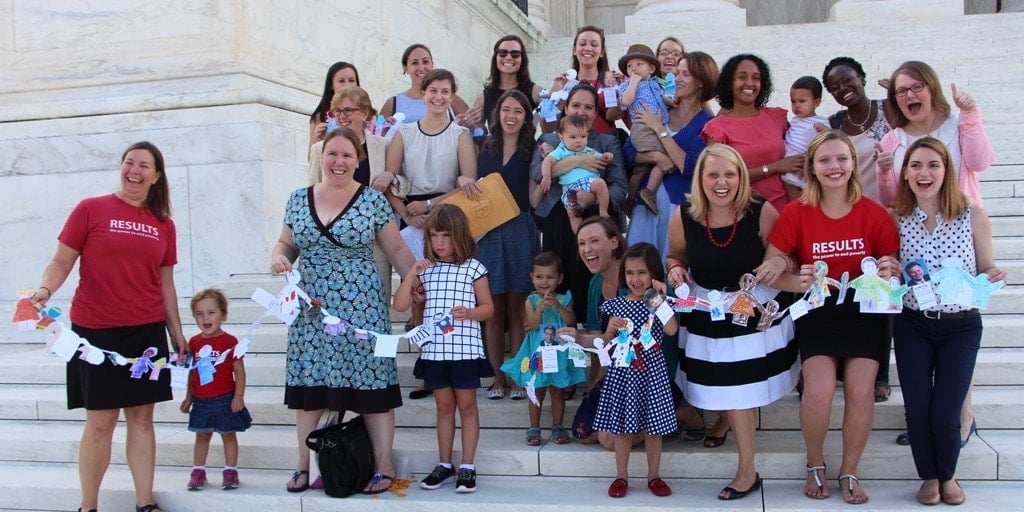
by Cindy Levin | Nov 3, 2015 | 2015, Maternal Health, World Moms Blog, World Voice
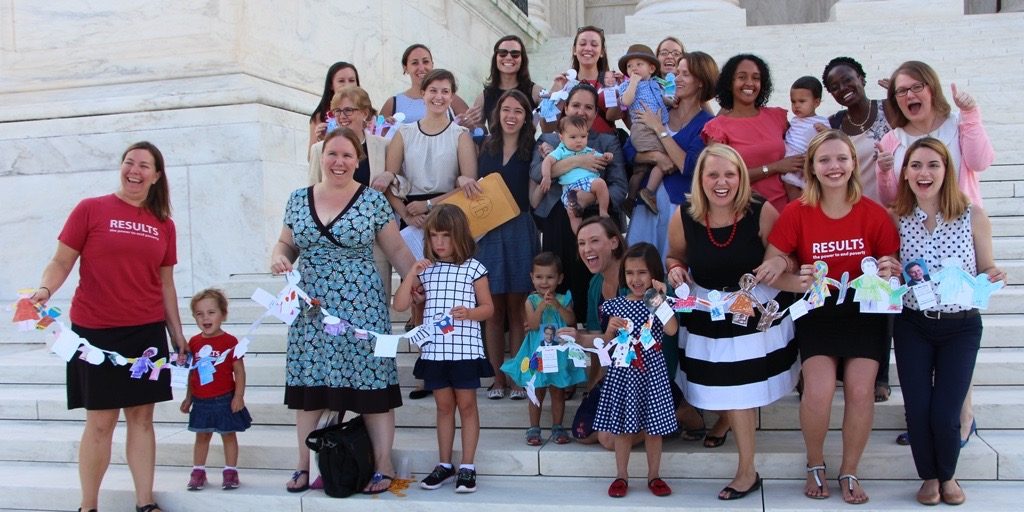
RESULTS staff and volunteer moms and kids in DC bringing paper dolls to senators in support of the Reach Act
Photo Credit: RESULTS Educational Fund
Today is Election Day in the United States. You may not have heard much about it since we aren’t voting on a president this year. Sadly, since most of the items on the ballot are at a local level, most Americans won’t bother to go to the polls and our media will mainly view Election Day 2015 as merely a kick-off to next year’s presidential election. Many citizens of my country are excited yet also fearful about what a change of president or Congress will bring for the issues they care about. Helplessly, they feel like the only thing they can do is wait a whole year until they get a ballot full of dubious choices.
They feel oddly powerless even while living in a country often held up around the world as an example of democracy. Is that the way we have to feel for 365 more days?
Fortunately, it doesn’t have to be that way! Election Day in any country shouldn’t be the only time a citizen raises her voice. Here in the United States especially, we should live up to our fine reputation of democracy by engaging in it any day of the year to make progress on what matters to us most. Take, for example, the global issue of maternal/child health.
In September, UNICEF released new data showing that the number of children under five dying every year has been cut by more than half since 1990. Longstanding, bipartisan U.S. support for child survival has played a key role in this progress. Yet the world still loses 5.9 million children every year, largely from preventable causes. We know that we can do better for these kids and we don’t want to lose any progress we’ve made. The last decade has seen effective reforms in the way the U.S. provides nutrition, immunizations, and assistance for infants and expecting mothers. If we have a change of leadership that doesn’t value these positive changes, we could lose valuable ground in the fight against child mortality. Thankfully, expert champions of moms and babies at RESULTS – an anti-poverty advocacy group – brought together a bi-partisan group of senators and representatives to introduce the Reach Every Mother and Child Act to prevent loss of progress and propel us toward a day when no child suffers a treatable or preventable death.
The Reach Every Mother and Child Act of 2015 would enshrine important development reforms into law, ensuring the U.S. does its part to help countries to end preventable child and maternal deaths by 2035. It would require clear targets, better accountability, investment in the most effective strategies to save lives, and a focus on the poorest and most vulnerable populations. I like to think of it as a “Don’t Break What We’ve Already Fixed” and “Do More of What Works” kind of policy. The Reach Act would help make certain that mothers and children can not only survive, but thrive.

Cindy Levin at Representative Ann Wagner’s office with her daughter and volunteers from RESULTS and the United Methodist Church asking the Congresswoman to co-sign the Reach Act
Photo Credit: Cynthia Changyit Levin
Citizens acting together to urge their leaders to pass this kind of altruistic legislation never makes headlines at CNN. Yet it is exactly the kind of actions that make the U.S. and many other nations great democracies. I believe in citizen action so much that I get my daughters into the act as much as I can. In addition to calling and writing to tell my elected officials to support the Reach Act, I’ve asked my kids and their friends to color paper dolls in solidarity with other kids at the RESULTS office in DC to deliver to senate offices. It’s never too early for kids to learn how to save other kids lives even before they reach voting age.
If you live in the U.S., I hope you go to your polling place and make your vote count for the local issues that are closest to you and your family. After that, however, I urge you on behalf of moms and babies everywhere to contact the offices of your U.S. senators and representative. Use the following weblinks to ask them to co-sign the Reach Every Mother and Child Act (“S.1911” in the senate and “H.R. 3706” in the House of Representatives) to help save the lives of mothers and kids around the world. You can even tell them that you voted this year and you intend to vote again next year based on how they respond to your request!
What issue will you bring to the attention of your government representatives?
This is an original post by Cindy Levin for World Moms Blog.
Cynthia Changyit Levin is a mother, advocate, speaker, and author of the upcoming book “From Changing Diapers to Changing the World: Why Moms Make Great Advocates and How to Get Started.” A rare breed of non-partisan activist who works across a variety of issues, she coaches volunteers of all ages to build productive relationships with members of Congress. She advocated side-by-side with her two children from their toddler to teen years and crafted a new approach to advocacy based upon her strengths as a mother. Cynthia’s writing and work have appeared in The New York Times, The Financial Times, the Washington Post, and many other national and regional publications. She received the 2021 Cameron Duncan Media Award from RESULTS Educational Fund for her citizen journalism on poverty issues. When she’s not changing the world, Cynthia is usually curled up reading sci-fi/fantasy novels or comic books in which someone else is saving the world.
More Posts - Website
Follow Me:


by Tina Marie Ernspiker | Oct 30, 2015 | 2015, Boys, Expat Life, Family, Health, Husband, Kids, Life Lesson, Living Abroad, Mexico, Motherhood, Parenting, World Motherhood, Younger Children
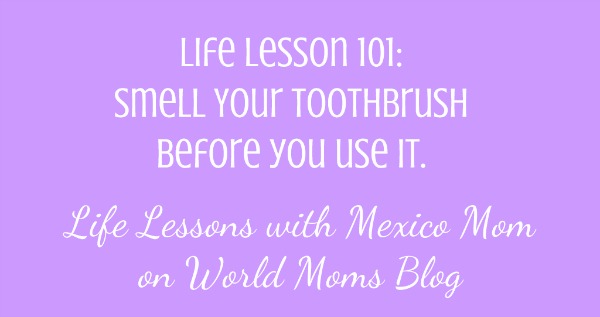
As a wife of one and a mom of four, it seems like I am always learning and discovering! I know I am not alone. It doesn’t matter where we live, let’s just admit it:
The world is a big place, life is a lesson, and children can be the best teachers.
Previously my series, Life Lessons with Mexico Mom, was hosted on Los Gringos Locos. Starting today, I will host it here on World Moms Blog. Look for it the last Friday of every month. I hope you will join us for our continuing adventures in Mexico and beyond. You won’t be disappointed 😉
Here are my most recent insights and experiences as a Mexico Mom: (more…)



























